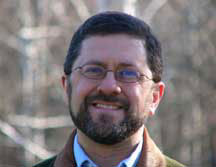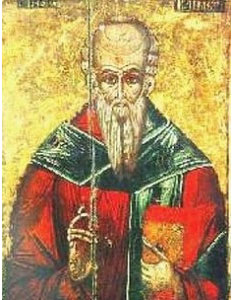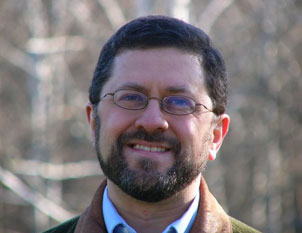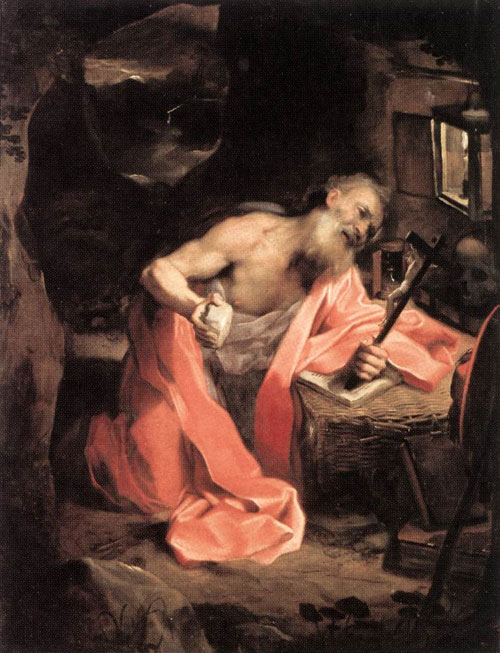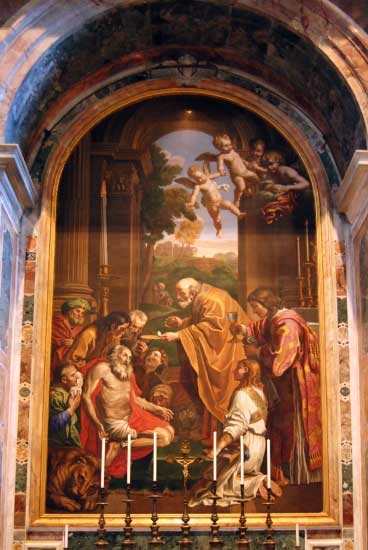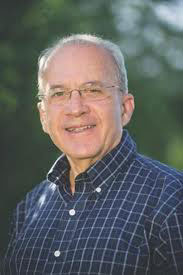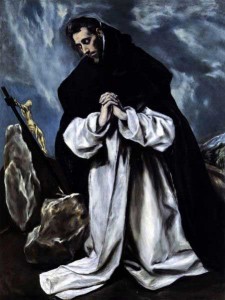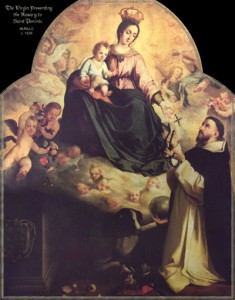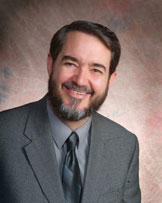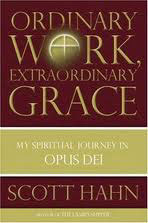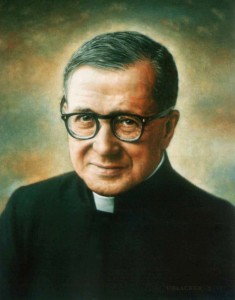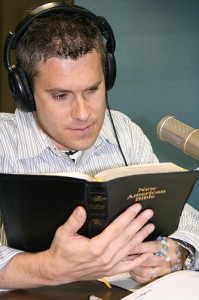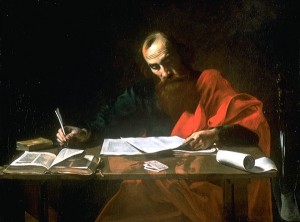from vatican.va –
Mother Josephine Bakhita was born in Sudan in 1869 and died in Schio (Vicenza) in 1947.
This African flower, who knew the anguish of kidnapping and slavery, bloomed marvelously in Italy, in response to God’s grace, with the Daughters of Charity.
Mother “Moretta”
In Schio (Vicenza), where she spent many years of her life, everyone still calls her “our Black Mother”. The process for the cause of Canonization began 12 years after her death and on December 1st, 1978 the Church proclaimed the Decree of the heroic practice of all virtues.
Divine Providence which “cares for the flowers of the fields and the birds of the air”, guided the Sudanese slave through innumerable and unspeakable sufferings to human freedom and to the freedom of faith and finally to the consecration of her whole life to God for the coming of his Kingdom.
In Slavery
Bakhita was not the name she received from her parents at birth. The fright and the terrible experiences she went through made her forget the name she was given by her parents. Bakhita, which means “fortunate”, was the name given to her by her kidnappers.
Sold and resold in the markets of El Obeid and of Khartoum, she experienced the humiliations and sufferings of slavery, both physical and moral.
Towards freedom
In the Capital of Sudan, Bakhita was bought by an Italian Consul, Callisto Legnani . For the first time since the day she was kidnappe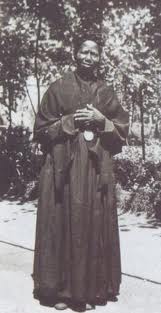 d, she realized with pleasant surprise, that no one used the lash when giving her orders; instead, she was treated in a loving and cordial way. In the Consul’s residence, Bakhita experienced peace, warmth and moments of joy, even though veiled by nostalgia for her own family, whom, perhaps, she had lost forever.
d, she realized with pleasant surprise, that no one used the lash when giving her orders; instead, she was treated in a loving and cordial way. In the Consul’s residence, Bakhita experienced peace, warmth and moments of joy, even though veiled by nostalgia for her own family, whom, perhaps, she had lost forever.
Political situations forced the Consul to leave for Italy. Bakhita asked and obtained permission to go with him and with a friend of his, a certain Mr. Augusto Michieli.
In Italy
On arrival in Genoa, Mr. Legnani, pressured by the request of Mr. Michieli’s wife, consented to leave Bakhita with them. She followed the new “family”, which settled in Zianigo (near Mirano Veneto). When their daughter Mimmina was born, Bakhita became her babysitter and friend.
The acquisition and management of a big hotel in Suakin, on the Red Sea, forced Mrs. Michieli to move to Suakin to help her husband. Meanwhile, on the advice of their administrator, Illuminato Checchini, Mimmina and Bakhita were entrusted to the Canossian Sisters of the Institute of the Catechumens in Venice. It was there that Bakhita came to know about God whom “she had experienced in her heart without knowing who He was” ever since she was a child. “Seeing the sun, the moon and the stars, I said to myself: Who could be the Master of these beautiful things? And I felt a great desire to see him, to know Him and to pay Him homage…”
Daughter of God
After several months in the catechumenate, Bakhita received the sacraments of Christian initiation and was given the new name, Josephine. It was January 9, 1890. She did not know how to express her joy that day. Her big and expressive eyes sparkled, revealing deep emotions. From then on, she was often seen kissing the baptismal font and saying: “Here, I became a daughter of God!”
With each new day, she became more aware of who this God was, whom she now knew and loved, who had led her to Him through mysterious ways, holding her by the hand.When Mrs. Michieli returned from Africa to take back her daughter and Bakhita, the latter, with unusual firmness and courage, expressed her desire to remain with the Canossian Sisters and to serve that God who had shown her so many proofs of His love.
The young African, who by then had come of age, enjoyed the freedom of choice which the Italian law ensured.
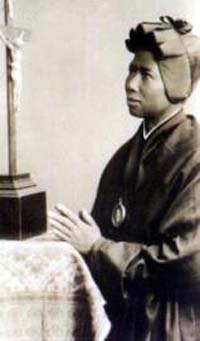 Daughter of St. Magdalene
Daughter of St. Magdalene
Bakhita remained in the catechumenate where she experienced the call to be a religious, and to give herself to the Lord in the Institute of St. Magdalene of Canossa.
On December 8, 1896 Josephine Bakhita was consecrated forever to God whom she called with the sweet expression “the Master!”
For another 50 years, this humble Daughter of Charity, a true witness of the love of God, lived in the community in Schio, engaged in various services: cooking, sewing, embroidery and attending to the door.
When she was on duty at the door, she would gently lay her hands on the heads of the children who daily attended the Canossian schools and caress them. Her amiable voice, which had the inflection and rhythm of the music of her country, was pleasing to the little ones, comforting to the poor and suffering and encouraging for those who knocked at the door of the Institute.
Witness of love
Her humility, her simplicity and her constant smile won the hearts of all the citizens. Her sisters in the community esteemed her for her inalterable sweet nature, her exquisite goodness and her deep desire to make the Lord known.
“Be good, love the Lord, pray for those who do not know Him. What a great grace it is to know God!”As she grew older she experienced long, painful years of sickness.
Mother Bakhita continued to witness to faith, goodness and Christian hope. To those who visited her and asked how she was, she would respond with a smile: “As the Master desires.”
Final test
During her agony, she re-lived the terrible days of her slavery and more then once she begged the nurse who assisted her: “Please, loosen the chains… they are heavy!”
It was Mary Most Holy who freed her from all pain. Her last words were: “Our Lady! Our Lady!”, and her final smile testified to her encounter with the Mother of the Lord.
Mother Bakhita breathed her last on February 8, 1947 at the Canossian Convent, Schio, surrounded by the Sisters. A crowd quickly gathered at the Convent to have a last look at their «Mother Moretta» and to ask for her protection from heaven. The fame of her sanctity has spread to all the continents and many are those who receive graces through her intercession.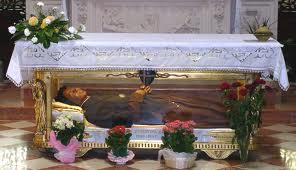
Every line of the Collect for Saint Bakhita merits attention; every phrase needs to be repeated in meditation.
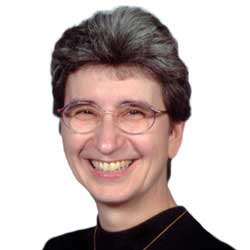
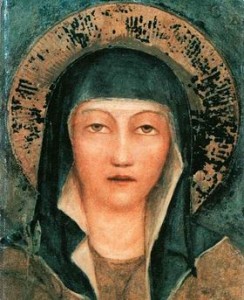 Abbess of San Damiano; born at Assisi, on 16 July 1194; died there on 11 August 1253.
Abbess of San Damiano; born at Assisi, on 16 July 1194; died there on 11 August 1253.
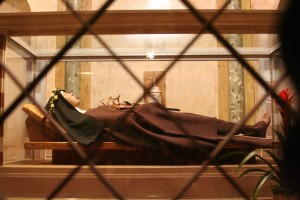 they were Clare’s), and then I turned and saw something incredible…the crypt of St. Clare. I quietly walked over to the enclosure grates. I knelt and unexpectedly started to weep…I just couldn’t help it. It was so quiet and peaceful; it was such a gift. I brought to St. Clare all the petitions I held deeply in my heart. And when that was done, silence once more filled the space. After about 10 minutes, I could hear the sound of the Poor Clare Sisters in the distance chanting their morning office. I knelt at that spot and listened with St. Clare. After about 30 minutes, I praised God for this special moment and left the basilica. St. Clare has been with me in a special way ever since a friendship I continue to cherish. Dear St. Clare, pray for us.
they were Clare’s), and then I turned and saw something incredible…the crypt of St. Clare. I quietly walked over to the enclosure grates. I knelt and unexpectedly started to weep…I just couldn’t help it. It was so quiet and peaceful; it was such a gift. I brought to St. Clare all the petitions I held deeply in my heart. And when that was done, silence once more filled the space. After about 10 minutes, I could hear the sound of the Poor Clare Sisters in the distance chanting their morning office. I knelt at that spot and listened with St. Clare. After about 30 minutes, I praised God for this special moment and left the basilica. St. Clare has been with me in a special way ever since a friendship I continue to cherish. Dear St. Clare, pray for us.
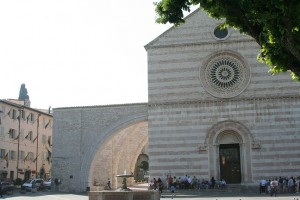
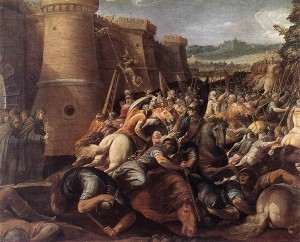
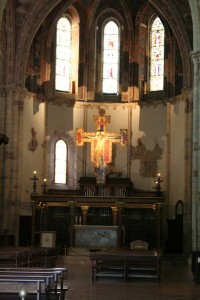
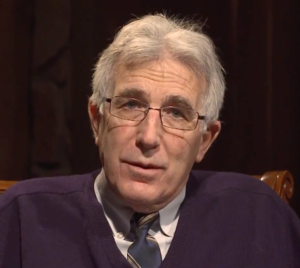
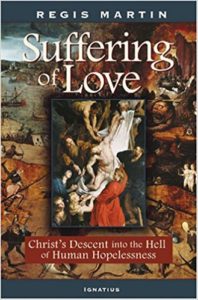
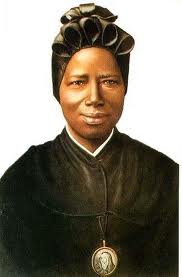 JOSEPHINE BAKHITA (1869-1947)
JOSEPHINE BAKHITA (1869-1947) d, she realized with pleasant surprise, that no one used the lash when giving her orders; instead, she was treated in a loving and cordial way. In the Consul’s residence, Bakhita experienced peace, warmth and moments of joy, even though veiled by nostalgia for her own family, whom, perhaps, she had lost forever.
d, she realized with pleasant surprise, that no one used the lash when giving her orders; instead, she was treated in a loving and cordial way. In the Consul’s residence, Bakhita experienced peace, warmth and moments of joy, even though veiled by nostalgia for her own family, whom, perhaps, she had lost forever. Daughter of St. Magdalene
Daughter of St. Magdalene
